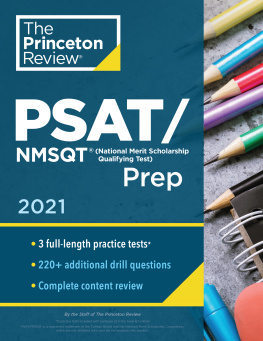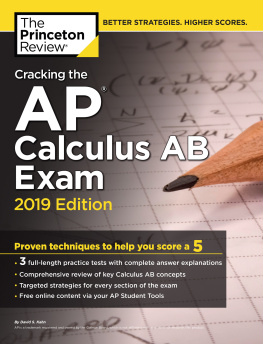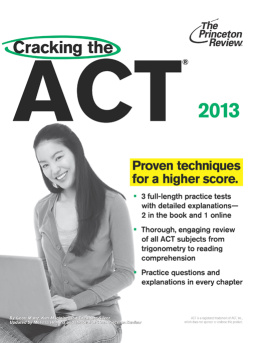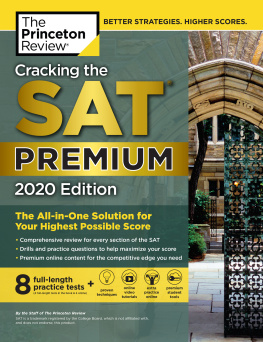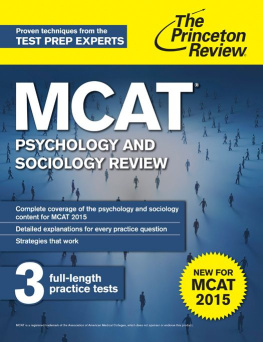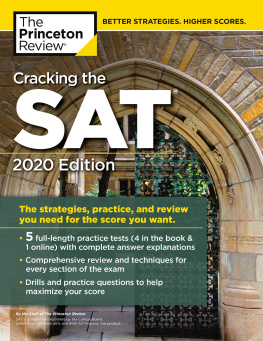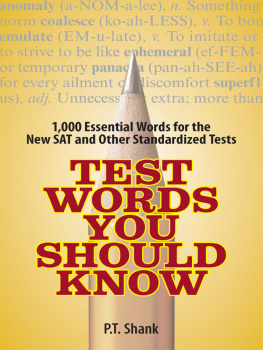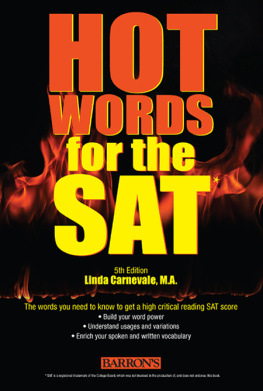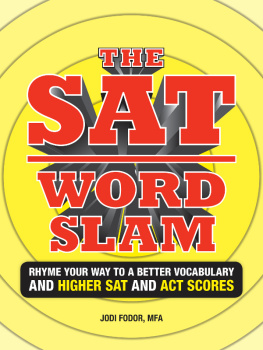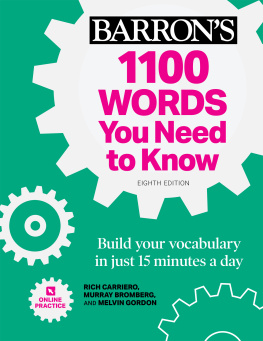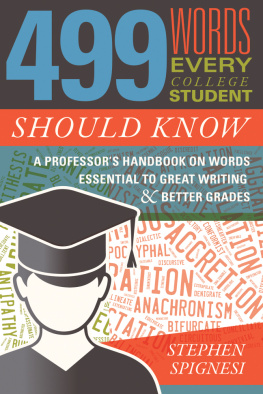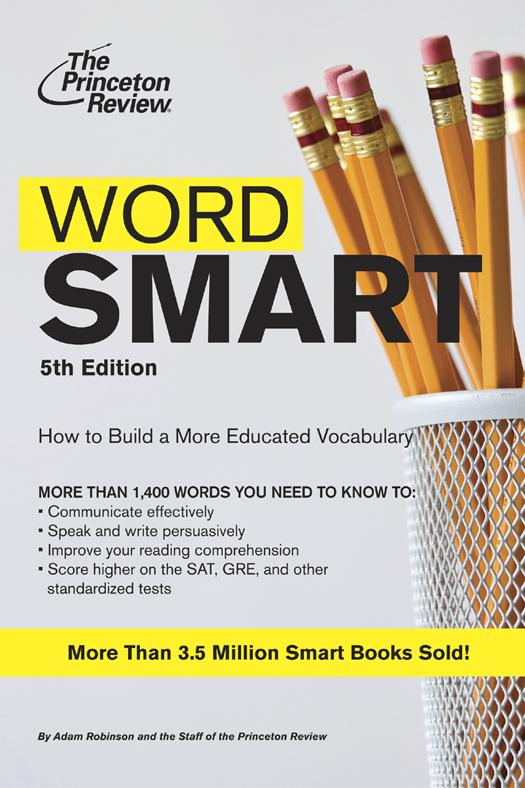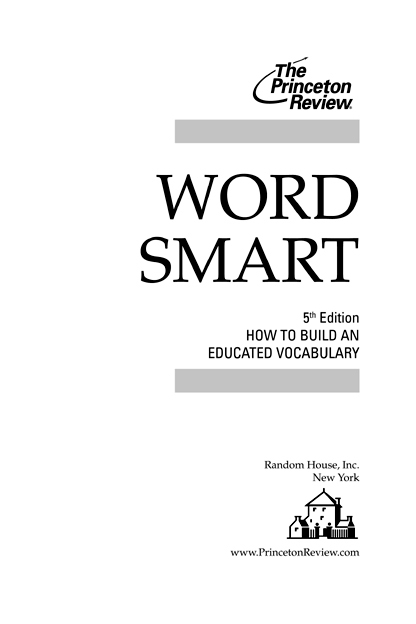The Independent Education Consultants Association recognizes The Princeton Review as a valuable resource for high school and college students applying to college and graduate school.
The Princeton Review, Inc.
111 Speen Street, Suite 550
Framingham, MA 01701
E-mail:
Copyright 2012 by The Princeton Review, Inc.
Cover art Brownstock/Alamy
Cover design by Andrea Lau
All rights reserved under International and Pan-American Copyright Conventions. Published in the United States by Random House, Inc., New York, and simultaneously in Canada by Random House of Canada Limited, Toronto.
The Princeton Review is not affiliated with Princeton University.
eISBN: 978-0-307-94503-7
v3.1
CONTENTS
INTRODUCTION
YOUR VOCABULARY HAS BEEN TALKING ABOUT YOU BEHIND YOUR BACK
The words you use say a lot about you. Some words say that you are smart, persuasive, and informed. Others say that you dont know what you are talking about. Knowing which words to use and understanding how to use them are keys to getting the most out of your mind.
People often say in frustration, I know what I mean, but I dont know how to say it. If the right words arent there, the right ideas cant get through.
Your vocabulary is the foundation of your ability to share your thoughts with other people. When you improve your vocabulary, you improve your ability to bring your intelligence to bear on the world around you.
BIGGER ISNT NECESSARILY BETTER
When people say that someone has a good vocabulary, they usually mean that he or she uses a lot of important-sounding wordswords like jactitation, demulcent, and saxicolous. But a vocabulary consisting of words like these isnt necessarily a good vocabulary.
Why?
Because almost no one knows what jactitation, demulcent, and saxicolous mean. If you used these words in conversation, the chances are that no one listening to you would know what you were talking about. Big, difficult words have important uses, but improving a vocabulary involves much more than merely decorating your speech or your writing with a few polysyllabic zingers.
The goal of communication is clarity. We write and speak in order to make ourselves understood. A good vocabulary is one that makes communication easy and efficient. One mark of an effective speaker or writer is his or her ability to express complex ideas with relatively simple words.
Most discourse among educated people is built on words that are fairly ordinarywords youve heard before, even if you arent exactly certain what they mean. The best way to improve your vocabulary isnt to comb the dictionary for a handful of tongue-twisters to throw at unsuspecting strangers. Instead, you need to hone your understanding of words that turn up again and again in intelligent communication. A person who had a clear understanding of every word in an issue of The New York Times, The Wall Street Journal, or Harpers would have a powerful vocabularya vocabulary sophisticated enough to impress almost any teacher, admissions officer, colleague, or employer.
AN EDUCATED VOCABULARY
An educated vocabulary is one that enables you to convey ideas easily. Do you know what inveterate means? Do you know the difference between flaunt and flout? Do you know why an artist might be insulted if you called his or her work artful?
None of these words is particularly difficult. But each has its own meaning or meanings. If you misuse these words, you communicate that you are in over your head. Using them correctly can identify you as a member of that most elite of elites: people who know what theyre talking about.
WHATS THE PROBLEM?
When people get into trouble with words, it usually isnt because they dont know the meaning of a seldom-used word like termagant but because they are confused about the meaning of a much more common worda word they hear, read, and even use with regularity.
Take the word peruse, for example. Many people think that it means skim or glance over. But it doesnt. In fact, it means very nearly the opposite. To peruse a document is to read it carefully.
The number of words you know is less important than the care you take in learning the ones you really use. Speaking or writing well doesnt require an enormous vocabularybut it does require a confident one. And the way to gain confidence in your vocabulary is to buckle down and learn the words you need to make yourself clearly understood.
WHY YOU NEED THIS BOOK
There are a lot of vocabulary books out there. Most of them, we believe, arent that useful. Some contain too many words. Others contain too many absurdly difficult words. Some claim to be based on surefire tricks or painless learning methods. Most arent very good at helping people learn new words of any kind.
This book is different.
THE PRINCETON REVIEW APPROACH
The philosophy behind The Princeton Review is simple: We teach exactly what students need to know, and we make our courses smart, efficient, and fun. We were founded in the early 1980s, and just a few years later, we grew to have the largest SAT course in the country. Our success is indisputable. Were proud to compare our results with those of any preparation course in the nation. In addition, our first book, Cracking the SAT, was the first of its kind to appear on The New York Times best sellers.
In preparing students for the SAT and other standardized tests, we spend much of our time working on vocabulary. Despite what many people think, many intelligence or aptitude tests are largely tests of vocabulary.
The students who earn high scores on such tests are the students who know the right words. The success of our method is in part a result of our success in teaching vocabulary.
NEW WORDS IN A HURRY
Because our course lasts only a few weeks, we dont have much time to teach our students all the words they need to know to do well on the SAT. As a result, weve put a lot of thought into how people learnand retainnew words.
The methods we have developed are easy to use and, we believe, extremely effective. Theres nothing particularly startling about them. They rely mostly on common sense. But they do work. And although they were developed primarily for high school students, these methods can be used by anyone who wants to build a stronger, smarter vocabulary.
HOW THIS BOOK IS ORGANIZED
In , we describe our basic principles of vocabulary building. We also explain our general techniques for learning new words. You should apply these techniques as you work through the rest of the book. The more carefully you work, the more rapidly youll enhance your ability to use words effectively.
The heart of Word Smart is the large central section containing the thousand or so words we think an educated person ought to know. Each word is accompanied by a definition and one or more examples intended to help you understand how to use the word properly.
Many entries also include discussions of related words or certain shades of meaning. Scattered throughout the book are drills that should help you strengthen your new vocabulary and make it possible for you to assess your progress as you work along.


